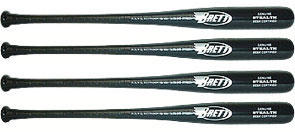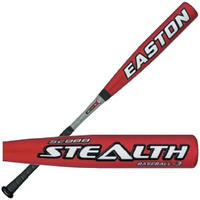George Brett Hits Grand Slam in Leo Stoller "STEALTH" Lawsuit
Hall of Fame slugger George Brett and his company, Brett Brothers Sports International, Inc., laid the wood to Leo Stoller in the latter's trademark infringement action brought in the Windy City. Central Mfg Co. v. Brett, 78 USPQ2d 1662 (N.D. Ill. 2005). Judge David H. Coar granted Brett's motion for summary judgment, cancelled Stoller's U.S. Registration No. 2,892,249 for the mark STEALTH for "baseball, softball, t-ball bats," and awarded attorneys' fees to the defendants.

Stoller and his companies claimed that Brett's use of the name STEALTH for a baseball bat infringed upon their rights in the STEALTH mark for baseball bats and other baseball products, under the Lanham Act and the Illinois Deceptive Trade Practices Act.
The court first noted that "Plaintiff Leo Stoller and his stable of corporate entities are not strangers to the legal system and are particularly familiar with the courts in this district. Indeed, as several judges (including this one) have previously noted, Stoller appears to be running an industry that produces spurious, vexatious, and harassing federal litigation."
"Unlike a public corporation, which would be accountable to its shareholders, Stoller's corporate entities appear impervious to Stoller's repeated losses in federal courts in this district and beyond. A search of the court filing system discloses that Plaintiff and one or more of his corporate entities have been involved in at least 49 cases in this district alone. *** No court has ever found infringement of any trademark allegedly held by Stoller or his related companies in any reported opinion. In fact, courts in this district have ordered Stoller or his corporate entities to pay defendants' attorney fees and costs in at least six reported cases."
The court recognized Stoller's modus operandi of offering a license under the STEALTH mark, and if refused, bringing a lawsuit. "The sheer number of cases Plaintiffs have filed in this district raise (sic) serious questions about Plaintiffs' and Plaintiffs' counsel's good faith. In fact, several courts in this district have noted explicitly that Plaintiffs deal in meritless claims and bad faith litigation."

With that introduction, the court turned to the substantive issues. In a less than crystal clear opinion, it found that Brett first used the mark STEALTH for baseball bats in 1999, which was prior to Plaintiff's first use date. This led to cancellation of the '249 registration (which stated a 2001 first use date for bats).
Plaintiffs claimed prior use of the STEALTH mark on other "baseball items," but "failed entirely to provide admissible evidence" of same. In fact, the court found that even if Plaintiffs once owned the mark STEALTH for baseballs, they abandoned that mark prior to Brett's first use in 1999. Plaintiffs' failure to produce documents came as no surprise to the court: Stoller testified on deposition that "he has no set practice for handling purchase orders or invoices. Sometimes he generates them, sometime he does not. He stated that he maintained records in bankers boxes in his office but did not know how many years' worth of records he had."
The court went on to find (if not entirely convincingly) that, even if Plaintiffs owned prior rights in the mark STEALTH for baseball bats, there would be no likelihood of confusion vis-a-vis the Brett bats. The Brett bats prominently display the word BRETT on both sides of the bat with the word STEALTH appearing in "significantly smaller letters," and Defendants emphasize the association with George Brett. Plaintiffs' licensee, Easton, features the word EASTON in prominent letters on one side of the bat and STEALTH on the other. Those facts "militate against finding likelihood of confusion." As to other lieklihood of confusion factors, the court found that Plaintiffs' mark is weak, that consumers would exercise care in purchasing Brett's $49 bat, that the goods travel in different trade channels, and that the lack of actual confusion weighs heavily against Plaintiffs.

Turning finally to the issue of attorneys' fees, the court found that Plaintiffs' conduct met the applicable standards:
"Here, Plaintiffs' conduct clearly rises to the level of 'oppressive.' Plaintiffs offered irrelevant, questionable, and seemingly fantastical documents; inconsistent, uncorroborated, or arguably false testimony from Leo Stoller; and a cascade of so-called license or settlement agreements for unrelated products and unrelated marks. In fact, Plaintiffs failed to produce evidence that Plaintiffs or any of their related companies made a single Stealth baseball bat at any time. Further, the enormous range in license fees listed in the alleged license agreements (from $10 to $25,000) strongly suggests what several courts in this district have suspected: that Plaintiffs engage in a pattern and practice of legitimate actors for the purpose of extracting a settlement amount. The judicial system is not to be used as an aid in such deliberate, malicious, and fraudulent conduct."
The court therefore awarded attorneys' fees under both the Lanham Act and the Illinois Consumer Fraud and Deceptive Business Practices Act.
Text Copyright John L. Welch 2005.




0 Comments:
Post a Comment
<< Home